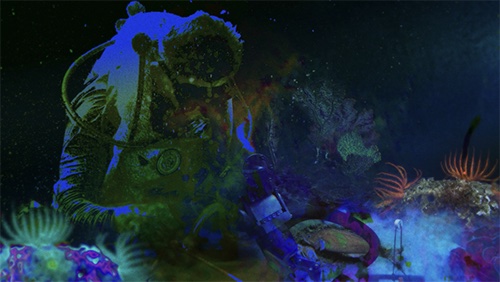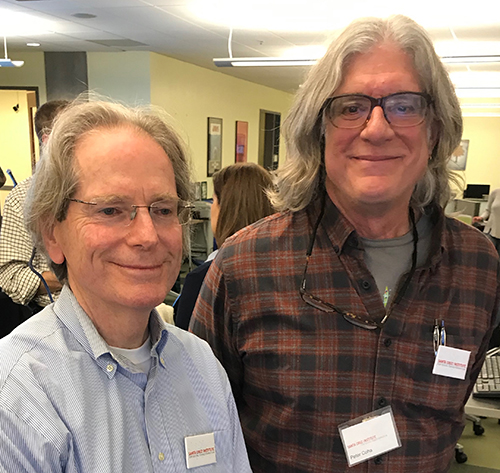Campus News
Coha/Gunderson Prize in Speculative Futures seeks 2022-2023 cohort
This year, the Coha/Gunderson Prize in Speculative Futures aims to expand its reach by offering five 2022-2023 prize winners, along with past awardees, the opportunity to participate in The Coha-Gunderson Creativity Workshop, a quarter-long winter workshop followed by a springtime exhibition.



Lifelong friends and philanthropic partners Peter Coha and James (Jim) Gunderson established the Coha/Gunderson Prize in Speculative Futures in 2020 under The Humanities Institute (THI). The competition has since seen seven total prize winners; all awarded a $1000 scholarship.
This year, the Coha/Gunderson Prize in Speculative Futures aims to expand its reach by offering five 2022-2023 prize winners, along with past awardees, the opportunity to participate in The Coha-Gunderson Creativity Workshop, a quarter-long winter workshop followed by a springtime exhibition.
Speculative Futures help visualize new and potential worlds. Inspired by art, film, fiction, writings, and more, speculative futures use speculation to imagine what lies ahead based on the present.
Peter Coha (Kresge ’78, mathematics) was the first to present the idea of a competition in speculative fiction open to all mediums at UCSC and invited his close friend Jim Gunderson (Rachel Carson ’77, philosophy) to help collaborate and fund the program.
“I thought it would be good to get people thinking about our current situation and environment and presenting what could happen in the future,” Coha says. “We could foretell possible outcomes and environments that people might not be thinking about but should be thinking about as possibilities.
Gunderson was excited to hop onto the project.
“I grew up on speculative futures science fiction and it influenced my own anticipation of accelerating change and trying to look at it from an ethical and societal impact perspective,” Gunderson said.
Projects submitted to the Coha/Gunderson Prize in Speculative Futures are delivered across a variety of mediums. Past submissions include written works, artworks, games & playable media, digitally altered photographs, and more.
Carla Freccero, Distinguished Professor in the Literature and History of Consciousness departments and head of the Speculative Futures Research Cluster, says the workshop and exhibition aim to allow awardees to flesh out their projects with the help of faculty experts from across the campus. Freccero says that many projects are submitted to the competition as proposals, and with a workshop offered in the winter quarter, students can bring their project proposals to completion.
The deadline to apply for this year’s competition is 11:59 p.m. PST on Nov. 4.
“How do you get students involved in wanting to solve problems in the world in an imaginative way? That’s where speculative futures come in,” Freccero says. “Speculatively scientific fictions of the future are imaginative ways of thinking about how to solve current world problems, from global warming and the planet’s wellbeing to present-day forms of social and political violence.”
2020-2021 prize winner Aaron Samuel Mulenga submitted two images of a planned installation featuring sculptural, visual and sonic elements. The project focuses on a marriage ritual among the Bemba people of Zambia called Mbusa and aims to explore the effects of African culture and technology on understandings of the world.
Mulenga says that the images “allow us to imagine what the future…could look like as communities continue to communicate with the past while looking to the future.”
A lifelong friendship
Coha and Gunderson have been close friends since the fifth grade. Once it was time for both of them to attend college, Coha chose to attend UC Santa Cruz while Gunderson went to UC San Diego. After two years at separate colleges, Coha convinced Gunderson to transfer to UCSC for his last years.
Now, the two friends are philanthropic partners, funding programs and scholarships across divisions at UC Santa Cruz.
“When we started these UCSC projects, it was just a fun way to do stuff together,” Gunderson said. “We’re idealistic creatures, and we always hope we’re being helpful or contributing. It’s great to experience it with a friend.”
Some of their other joint philanthropic projects at UCSC include the Center for Monster Studies, the Gregg Barnes Costume Design Award, the Art and Oppression Initiative, and the James Gunderson and Peter Coha Comic Book Collection. They’ve also helped to fund the Digital Scholarship Innovation Studio at the Science and Engineering Library, the Everett Program’s Gateways Digital Media Project, and more.
“Getting together on a friendship level is great, but also from a philanthropy level, being able to provide seed capacity, seed money, and seed ideas for people to develop further, I think is exciting,” Coha said. “And to see those projects flourish is pretty fun.”